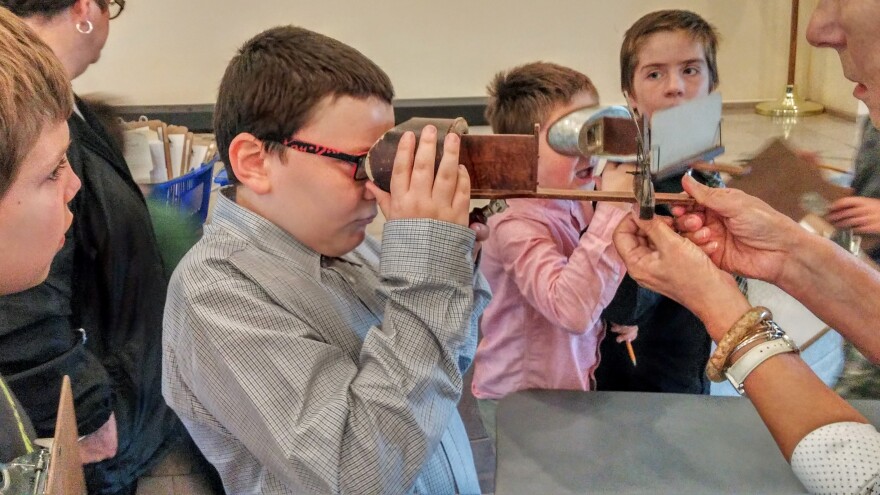Today, millions of Americans around the country are performing their civic duty at the voting booth. But here in New Hampshire, there’s growing concern that students aren’t learning enough about the historical foundations behind that tradition.
In the large, stately lobby of the New Hampshire Historical Society in Concord, a group of fourth graders is ushered up a set of marble stairs.
Peggy Halacy, a museum teacher with the Historical Society, captures their attention and begins motioning toward the artifacts that adorn the walls.
“Now I’d like you to look over here at the eagle. This is the actual, real eagle that was on top of the state house when it was built in 1818.”
These students, from McClelland Elementary School in Rochester, are on a field trip that fourth graders in New Hampshire have been going on since 1964. Each year, about 70 percent of all fourth graders in the state visit the Historical Society. For many schools this fieldtrip to the Historical Society is a capstone to a year’s worth of curriculum on New Hampshire state history.
But according to Elizabeth Dubrulle, Director of Education at the Historical Society, what used to be a capstone is becoming a substitute for a history education that she says students are no longer receiving in the classroom.
“We used to employ a very Socratic method with the kids. We would try keeping them engaged by asking a lot of questions, drawing on what they knew. We had to change that because we would ask questions and it would be crickets. They didn’t know. They weren’t getting the background.”
It’s a problem the Historical Society is dubbing the ‘history deficit.’

Dubrulle and the museum teachers here seem to have no shortage of alarming anecdotes to support that claim: students who named ISIS as America’s enemy in the Revolutionary War or who were unable to name the president during the Civil War.
“It’s been pretty shocking. We’ve had kids from Manchester schools, who when they came through our field have trip said they had no idea there were mills in Manchester. They had no idea what those brick buildings were that they saw everywhere.”
In an effort to address the problem, the New Hampshire Historical Society is creating a free, online curriculum on New Hampshire history for fourth graders.
“We need to have resources to offer these schools, so that we’re not just banging the drum about a problem and not giving them an opportunity to get out of the problem. To fix it.”
Ken Relihan worked as Social Studies Supervisor with the state Department of Education for 14 years. He says he is not surprised to hear the Historical Society talking about a ‘history deficit.’
It’s a problem that he says goes back to the federal No Child Left Behind law passed in 2001. Relihan says the law emphasized reading and math at the expense of other subjects like social studies.
“I went to a meeting and a supervisor stood up and talked about how they had literally doubled math instruction. And I put up my hand and I said ‘well that’s very nice but where did the time come from?’ And she smiled at me and she said ‘you know.’”

Relihan applauds the Historical Society’s effort to address the issue. But he thinks it will take more than a free curriculum. He says the state needs to show school districts that social studies are important again. One way to do that, he says, is to fill his former position, which has been vacant for over 2 years.
But Paul Leather with the state DOE says they are focusing on social studies. Over the course of the next year, he says they will be updating the state guidelines on history curriculum.
And he adds that the new federal replacement for No Child Left Behind, the Every Students Succeeds Act, will take some of the pressure off teachers and allow more time for subjects other than reading and math.
“Under the Every Student Succeeds Act, there’s really much more of an emphasis on local and state design as opposed to federal mandates, so there’s going to be a lot more flexibility in this area.”
But because there is no standardized test for history in New Hampshire, it will be difficult to tell whether a new federal law, more support from the state, or even a free curriculum, is helping.
We may have to wait until educators at the Historical Society begin to notice a difference in the students that visit each year.







